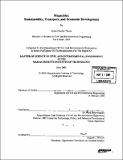| dc.contributor.advisor | Fred Moavenzadeh. | en_US |
| dc.contributor.author | Tobias, Justin Charles, 1980- | en_US |
| dc.contributor.other | Massachusetts Institute of Technology. Dept. of Civil and Environmental Engineering. | en_US |
| dc.date.accessioned | 2006-02-02T18:52:06Z | |
| dc.date.available | 2006-02-02T18:52:06Z | |
| dc.date.copyright | 2005 | en_US |
| dc.date.issued | 2005 | en_US |
| dc.identifier.uri | http://hdl.handle.net/1721.1/31140 | |
| dc.description | Thesis (S.M.)--Massachusetts Institute of Technology, Dept. of Civil and Environmental Engineering, 2005. | en_US |
| dc.description | Includes bibliographical references (p. 152-160). | en_US |
| dc.description.abstract | The connections between sustainability, transport, and economic development are and will remain essential in the governance of cities. Sustainability concepts include valuing and preserving the earth's resources so that future generations can enjoy their benefits. It requires changing human behavior and practices to be more efficient and less damaging to the environment, especially with the current rates of population growth and urban concentration. In addition, there is the element of social equity in which investments should secure benefits for all classes of society, not just the affluent. These concepts are particularly applicable in transportation systems, because they have been neglected in the traditional quantitative approaches to planning and investment. Of course, policies defining transportation and those enacted for sustainability impact economic development, which is a chief priority of governments. Therefore, future success in urban areas lies in balancing an array of interests and adopting the most comprehensively advantageous policies. This study will demonstrate the need for rethinking traditional urban transportation development strategies. It will detail the problems associated with urban transport that infringe on environmental conditions and human quality of life. This paper will explain approaches to transportation that can lead to improvements in the negative corollaries currently experienced. It will also present policy measures and tools that can be implemented. This research paper will provide information for city officials and planners to better understand the implications of transportation policies and the options available for governance. | en_US |
| dc.description.abstract | (cont.) These decisions are becoming more critical as urban growth leads to large metropolitan regions with incredible transportation demands. More optimistically, the challenges facing society from transport can be overcome through commitment to better policies and the strengthening of institutions that oversee them. | en_US |
| dc.description.statementofresponsibility | by Justin Charles Tobias. | en_US |
| dc.format.extent | 160 p. | en_US |
| dc.format.extent | 10430725 bytes | |
| dc.format.extent | 10452879 bytes | |
| dc.format.mimetype | application/pdf | |
| dc.format.mimetype | application/pdf | |
| dc.language.iso | eng | en_US |
| dc.publisher | Massachusetts Institute of Technology | en_US |
| dc.rights | M.I.T. theses are protected by copyright. They may be viewed from this source for any purpose, but reproduction or distribution in any format is prohibited without written permission. See provided URL for inquiries about permission. | en_US |
| dc.rights.uri | http://dspace.mit.edu/handle/1721.1/7582 | |
| dc.subject | Civil and Environmental Engineering. | en_US |
| dc.title | Megacities : sustainability, transport, and economic development | en_US |
| dc.type | Thesis | en_US |
| dc.description.degree | S.M. | en_US |
| dc.contributor.department | Massachusetts Institute of Technology. Department of Civil and Environmental Engineering | |
| dc.identifier.oclc | 61184586 | en_US |
